Democratic debate: Clinton, Sanders, O’Malley sharpen their views on foreign policy, guns, immigration
- Share via
By the numbers
Welcome to a special Saturday debate-night edition of Trail Guide, your host through the wilds of the 2016 presidential campaign. It's Nov. 14, and this is what we're watching:
- The Democratic debate showed division on foreign policy but little else
- Debate host CBS opened with questions on security in light of the Paris attacks
- Democrats were pressed on Congress' role in authorizing the fight against the Islamic State
- Hillary Rodham Clinton credited ... George W. Bush ?
- Pro-immigration stances drew crowd support
- Bernie Sanders skipped another chance to go after Clinton on her emails
The biggest line of the first Democratic debate comes up again in the second
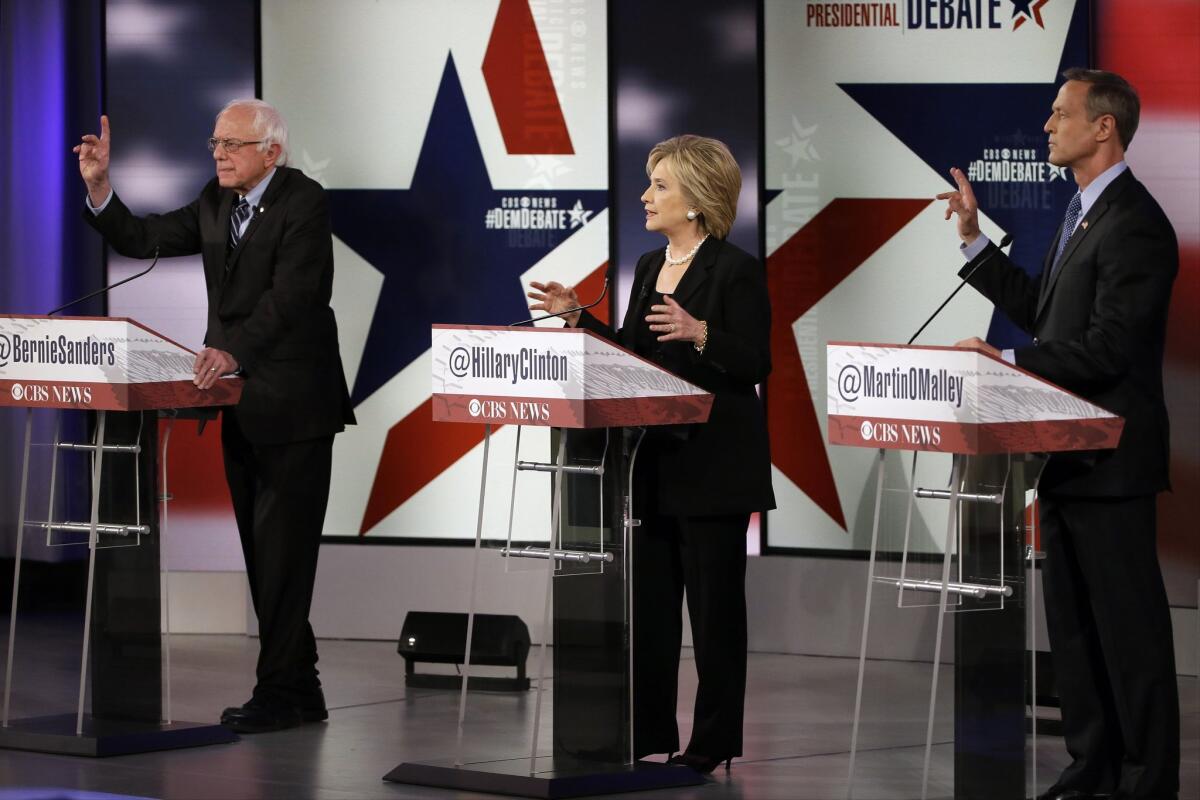
Democratic presidential candidates Bernie Sanders, left, Hillary Rodham Clinton and Martin O’Malley participate in a Democratic presidential primary debate, Saturday, Nov. 14, 2015, in Des Moines, Iowa. (AP Photo/Charlie Neibergall)
Bernie Sanders passed up an opportunity during Saturday's debate to take a shot at one of Hillary Rodham Clinton’s biggest vulnerabilities: her use of a private email server while secretary of State. Asked whether he was reconsidering his comment in the last debate that he was sick of hearing about Clinton’s emails, Sanders emphatically said he is not.
“I was sick and tired of Hillary Clinton’s email,” he said. “I am still sick and tired.” Sanders joked about how the issue faded from the headlines after he declared it wasn't worth all the attention it is getting. “I didn’t know I had so much power,” he said.
“What I would like for the media now is for us to be talking about why the middle class is disappearing, or we have more people in jail than any other country, or we have massive levels of income and wealth inequality,” Sanders said. “We’ve gotten off of Hillary Clinton’s emails. Good. Let’s go to major issues facing America.”
Clinton had no objection.
“I agree completely,” she said. “I couldn’t have said it better myself.”
While the email topic did not spark any tension, the issue of Wall Street repeatedly did. At one point, a moderator read a tweet from a debate watcher who took umbrage at Clinton’s suggestion that large campaign contributions she received from Wall Street were a product of partnering with financial firms in the effort to rebuild Lower Manhattan after 9/11.
Clinton said she regretted the perception her earlier answer may have left, but she made no apologies for her plan to rein in Wall Street.
But Sanders and Martin O’Malley pounded her on an economic plan that does not include reauthorizing the Glass-Steagall Act, intended to break up the big banks.
“Their business model is greed and fraud,” Sanders said. “For the sake of our economy, the major banks must be broken up.”
Clinton said the prescription of her rivals would do less to curb Wall Street excess than her own bank plan. She cited prominent liberal economists who have sided with her, including Paul Krugman and Paul Volcker.
“I have nothing against the passion my two friends have,” she said of the attacks from Sanders and O’Malley on her Glass-Steagall position. “I just don’t think it would get the job done. I am about actually making sure we get results."
Clinton, O'Malley and Sanders name their biggest tests
Clinton on college affordability
A fight over guns
Democrats' pro-immigration stances please debate crowd
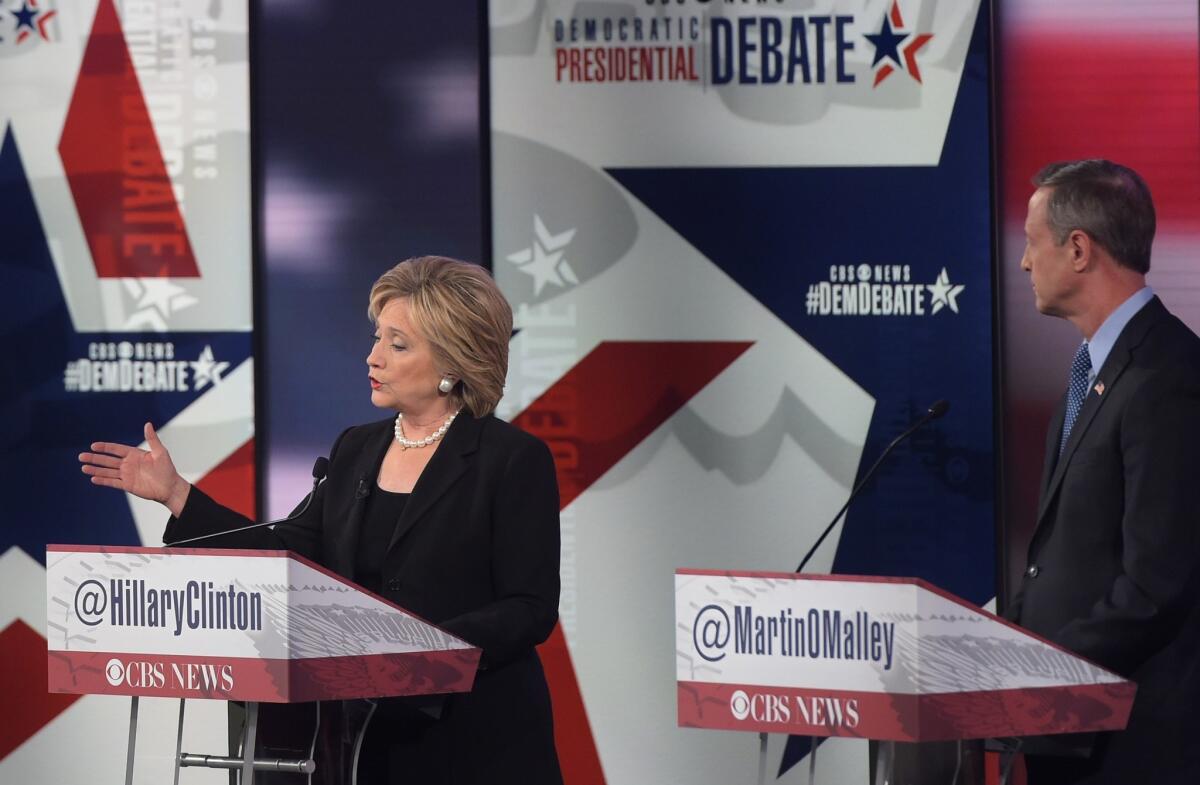
Democratic Presidential hopeful Hillary Clinton (L) speaks as Martin OMalley looks on during the second Democratic presidential primary debate in the Sheslow Auditorium of Drake University on November 14, 2015 in Des Moines, Iowa. AFP PHOTO/ MANDEL NGANMANDEL NGAN/AFP/Getty Images ** OUTS - ELSENT, FPG, CM - OUTS * NM, PH, VA if sourced by CT, LA or MoD **
To the delight of the crowd, all of the candidates in Saturday night's debate positioned themselves as aggressively pro-immigrant and drew a sharp contrast between their outlook and that of the Republicans.
“The fact of the matter is -- and let’s say it in our debate because you will never hear it from that immigrant-bashing carnival barker Donald Trump -- the truth of the matter is net immigration from Mexico last year was zero,” former Maryland Gov. Martin O’Malley said in response to weighing immigration reform against the need for border security.
“We’ve been focusing on border security to exclusion of talking about comprehensive immigration reform,” he said. “Our symbol is the Statue of Liberty, it is not a barbed wire fence.”
Hillary Rodham Clinton said much the same, adding that she believes the recent federal court decision blocking President Obama’s executive action temporarily protecting some immigrants from deportation will not stand.
“Let’s move toward what we should be doing as a nation and follow the values of our immigration history and make it possible for [people in the U.S. illegally] to come out of the shadows and to have a future that gives them a real path to citizenship,” she said.
Bernie Sanders’ shifting position on gun control
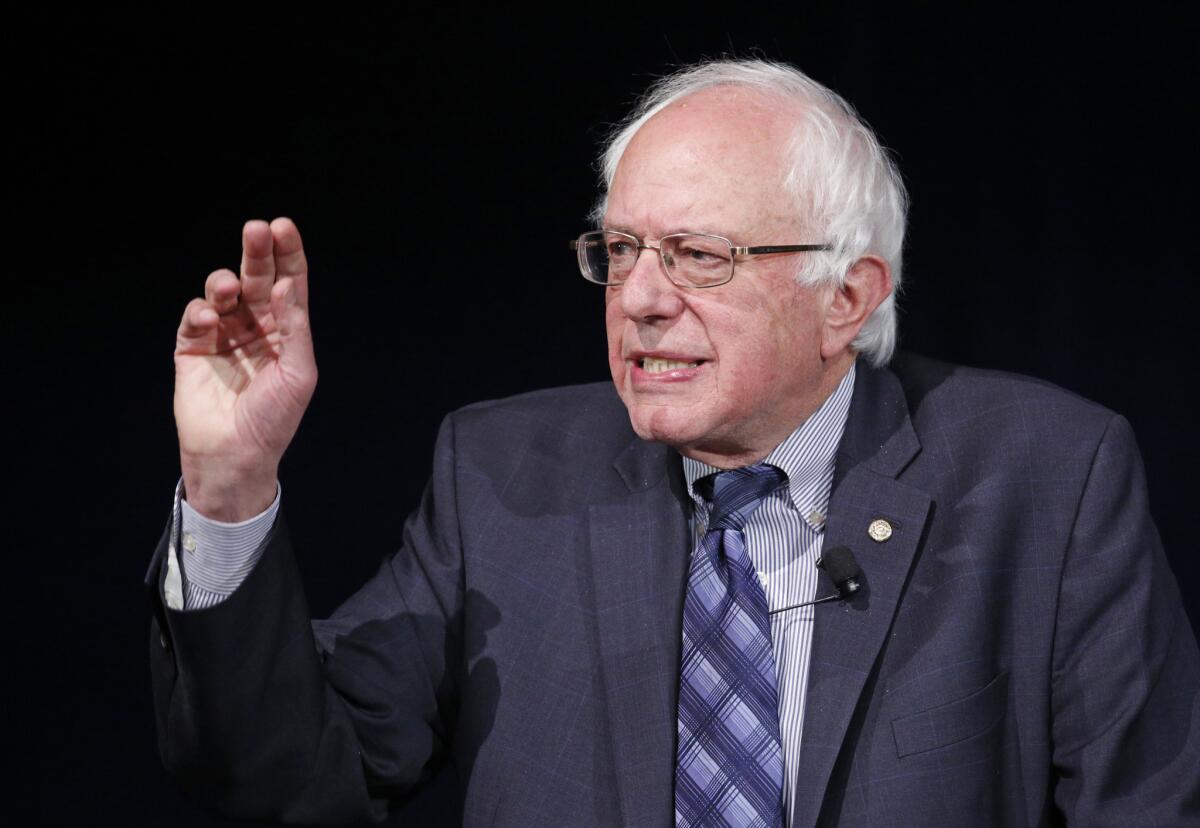
FILE - In this Nov. 9, 2015 file photo, Democratic presidential candidate Sen. Bernie Sanders, I-Vt., speaks in Las Vegas. (AP Photo/John Locher, File)
Sen. Bernie Sanders of Vermont has been repositioning himself on gun control, trying to square his record of voting several times against landmark firearms restrictions with his push for an assault weapon ban.
Sanders says his background representing a rural state full of hunters positions him ideally to break the political logjam on the issue. His Democratic opponents, though, are seizing on his mixed record in their efforts to weaken his standing with progressives. When Sanders suggested gun control is not getting traction in Congress because advocates spend too much time “shouting” instead of building consensus, Hillary Rodham Clinton pounced.
She suggested the remark was sexist. “I haven’t been shouting, but sometimes when a woman speaks out, some people think it’s shouting,” Clinton said at a speech in Des Moines late last month.
She went after him again Saturday night, given an opening by moderator John Dickerson of CBS News.
“This is an emergency. … We have also got to go after the gun lobby,” she said, demanding that Congress close the loophole that allows firearms to be purchased at gun shows without a background check.
Sanders noted that he has repeatedly voted in favor of background checks and wants “radical changes in mental health in this country.”
In a South Carolina candidates’ forum last week, Sanders returned to the shouting theme. “If we are going to make progress on this issue – and I know that Hillary Clinton has kind of misstated my view – as a nation, we are going to have to stop shouting at each other, and we’re going to have to come together. … Very strong gun control advocates may not get everything they want. And people who think they should have a missile launcher in their backyard as a constitutional right may not have that.”
The guaranteed applause line for Democrats: Donald Trump
Martin O'Malley showcases his bold immigration plan
In an interview with The Times in September, Martin O'Malley, the former Maryland governor, detailed his immigration plan that calls for protection from deportation for all 11 million or so people in the U.S. illegally:
U.S. fighting Islamic State even though Congress has yet to vote on it
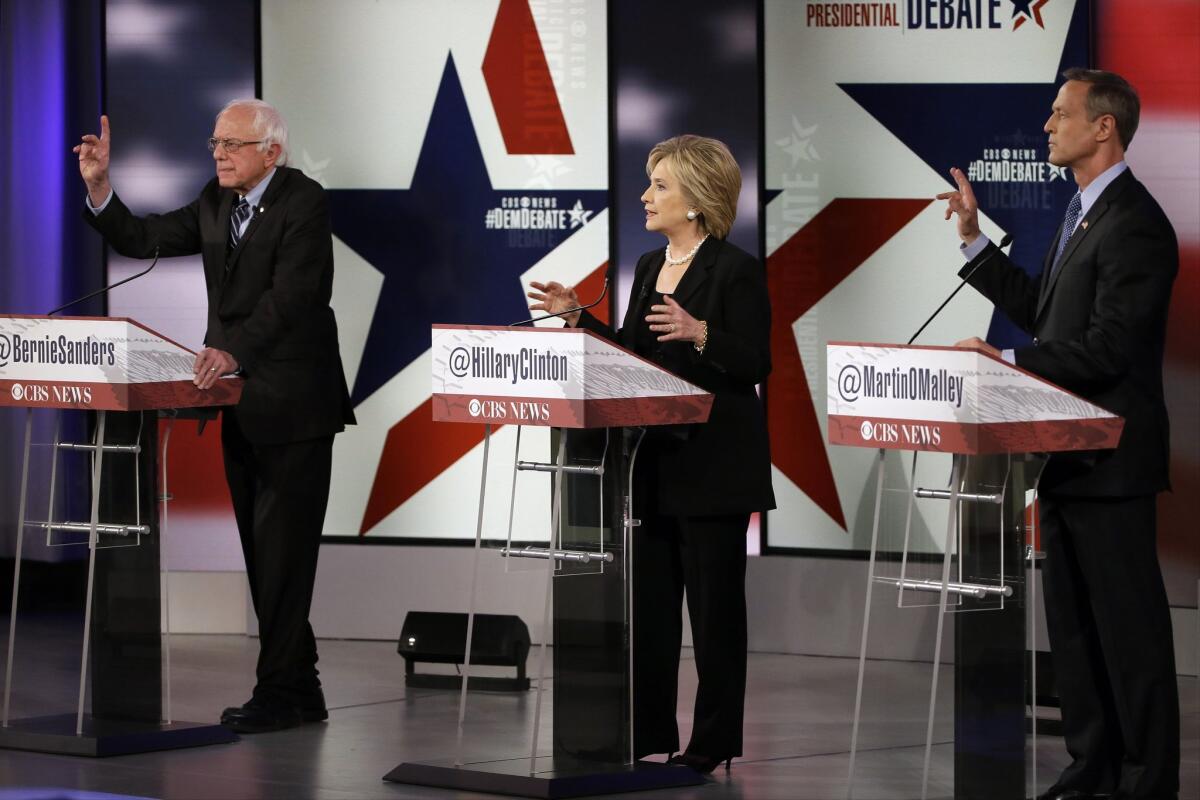
Democratic presidential candidates Bernie Sanders, left, Hillary Rodham Clinton and Martin O’Malley participate in a Democratic presidential primary debate, Saturday, Nov. 14, 2015, in Des Moines, Iowa. (AP Photo/Charlie Neibergall)
Democratic presidential candidates are debating the appropriate response to Islamic State terrorism at a time when Congress has been paralyzed for months over how to act.
"We have an authorization to use military force against terrorists,” Hillary Rodham Clinton said during Saturday night’s debate. “We passed it after 9/11. I would like to see it updated."
President Obama called for Congress to authorize use of military force against the terrorist group, also known as ISIS or ISIL, back in February . Congress has yet to move on it.
The president’s request came as the U.S. military was already engaged in a coalition campaign that had dropped thousands of bombs on Islamic State targets. The bombing had been going on since the previous August, set in motion by the Obama administration after the militants swept out of Syria and overran western Iraq so quickly that they reached the edge of Baghdad before they were stopped.
Obama sought the resolution in the hopes of displaying to the world that American use of force had broad, bipartisan support back home.
But Republicans warned the resolution was too weak. They wanted more aggressive action than the administration was pushing. Democrats warned the language was too open-ended and could result in bombing campaigns spreading through the region. The politics of the president’s proposal, which would expire in three years, does not limit the missions Obama or his successor could approve, barring only what it calls “enduring offensive ground combat operations.” Military leaders were vague about what that meant.
The president’s effort has been complicated by Democrats who remain skeptical of casting such votes after authorizing the use of force in Iraq more than a decade ago. Many say they were misled by the Bush administration about the situation in that country. Others have been elected to office since then, campaigning on vows to vote against authorization for another such open-ended conflict. When Obama asked Congress in September of 2014 to approve a narrow component of his strategy against Islamic State, training and equipping Syrian opposition fighters, House Democrats voted only 114 to 85 to support it, for example.
Why 'Islamic extremism' is a phrase that politicians fight over
Politicians’ use of the phrase “Islamic extremism” has been debated since 9/11, and the Paris attacks started a new chapter in the discussion. Obama administration officials generally avoid using it, following the president’s reasoning that the U.S. is not at war with a religion. That has opened him up to criticism from Republicans.
Asked about the phrase during the debate, Hillary Rodham Clinton sought to credit former President George W. Bush with insisting it not be used.
“That was one of the real contributions, despite all the other problems, that George W. Bush made after 9/11,” Clinton said. She quoted Bush as saying the U.S. is not at war with Islam but with violent extremism.
Earlier this year, The Times examined the debate over the term “Islamic extremism" that has begun anew since the rise of Islamic State.
Bernie Sanders is forceful on the Iraq war
Candidates separate themselves early on Islamic State
All three candidates opened by condemning the Paris attacks and the terrorist group Islamic State, which has claimed responsibility. Each Democrat sought to shape their answers to their strengths as candidates.
“Leading the world, our country will rid this planet of this barbarous menace known as ISIS,” Vermont Sen. Bernie Sanders said, before turning to his core issues of inequality and the economy.
“Our prayers are with the people of France tonight, but that is not enough. We need to have a resolve that will bring the world together to root out the kind of radical jihadist ideology that motivates organizations like ISIS,” former Secretary of State Hillary Rodham Clinton said, seeking to position herself as determined and authoritative on how to defeat Islamic State militants.
“My hearts go out to the people of France in this moment of loss: sons and daughters and family members.… This is the new face of conflict and warfare … in the 21st century.… We must be able to work collaboratively with others. We must be able to anticipate these threats before they happen,” former Maryland Gov. Martin O’Malley said, also reminding viewers of his executive-branch experience.
Paris reminders at the start of the debate — and even before
Los Angeles congressman stumps for Hillary Clinton in Iowa
Latino voters may be scarce in Iowa, but even here Hillary Rodham Clinton’s campaign is constantly working to cultivate them.
On Saturday morning, U.S. Rep. Xavier Becerra of Los Angeles was touring a market popular with Latino shoppers in the central Iowa burg of Marshalltown, promoting Clinton. The congressman, one of the most prominent Latinos to endorse her, had been sent by the campaign to the state to serve as one of the surrogates that candidates bring into presidential debates to talk up their performance to the media afterward.
“The Latino community is a growing presence in the United States in every aspect,” he said. “In Iowa, it is no different. It is a growing presence. … I am going to go out there and work it hard.”
GOP candidates assail refugee plan in aftermath of Paris attacks
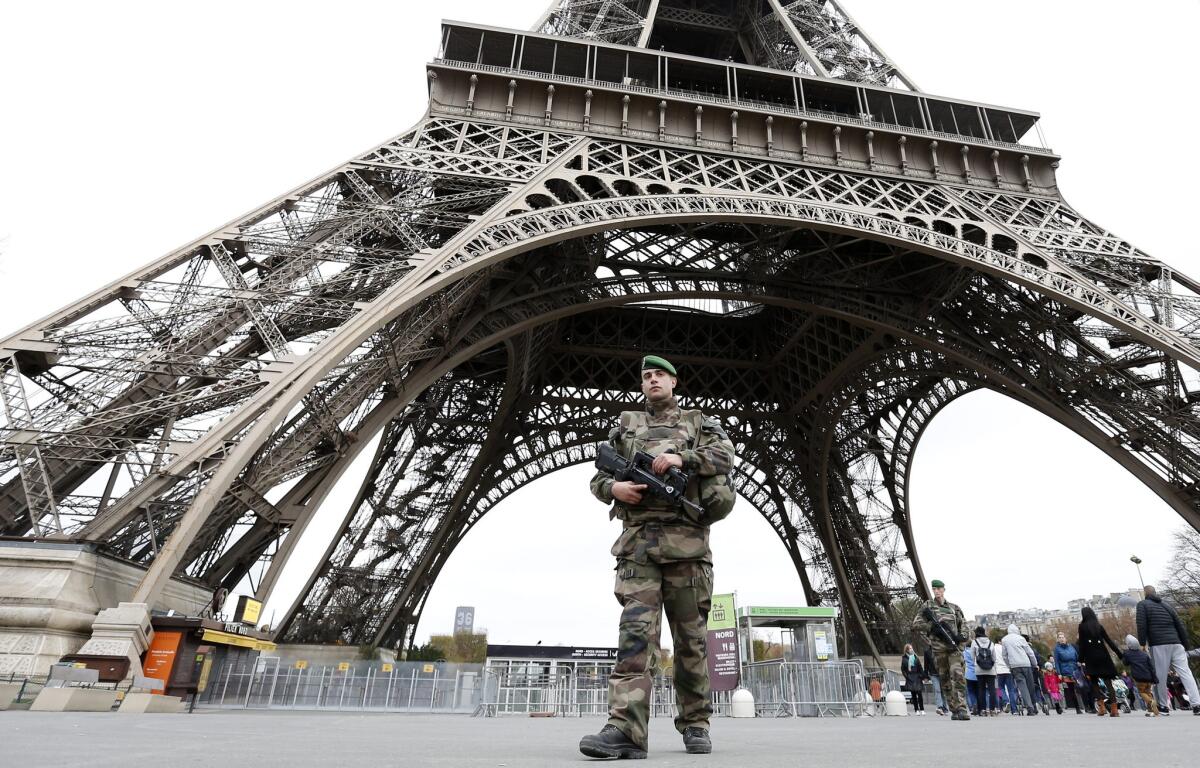
A soldier patrols under the Eiffel Tower in Paris on Nov. 14.
With Republicans badly divided over strategy to combat the Islamic State in Iraq and Syria, several GOP candidates aimed at an easier target Saturday -- refugees.
In the aftermath of the massive terrorist attacks in Paris, in which some of the attackers may have entered Europe along with Syrian refugees, Obama's plan to admit at least 10,000 Syrian refugees to the U.S. came under sustained criticism from the GOP field.
"With the problems our country has, to take in 250,000 people, some of whom are going to have problems, big problems, is just insane," Donald Trump declared at a rally in Beaumont, Texas, exaggerating the size of Obama's plan by a factor of 25.
Sen. Ted Cruz of Texas, in an interview on Fox News, said the U.S. should admit Christian refugees, "who are being targeted for genocide or persecution."
But "President Obama and Hillary Clinton's idea that we should bring tens of thousands of Syrian Muslim refugees to America is nothing less than lunacy," Cruz said.
In statements and campaign appearances, Mike Huckabee and Rick Santorum also criticized the refugee plan.
Sen. Marco Rubio of Florida and former Florida Gov. Jeb Bush both avoided direct comment on the refugee issue, instead calling for a more robust effort with U.S. allies to combat Islamic State, also known as ISIS, which controls a large swath of territory in eastern Syria and northern and western Iraq.
What such an effort might look like has sharply divided the GOP field. Some candidates, notably Sen. Lindsey Graham of South Carolina, have argued for sending U.S. ground troops to combat Islamic State.
Others oppose sending troops but have advocated enforcing a "no fly" zone along the Syrian-Turkish border to serve as a refuge for Syrians pushed out of their homes by the 4 1/2-year civil war in Syria. That's similar to a position taken by Democratic front-runner Hillary Rodham Clinton.
Sen. Rand Paul of Kentucky has sharply criticized the no-fly zone idea. At the GOP debate earlier this week he suggested it could lead to war with Russia, which has warplanes flying over Syria. His position resembles that of Sen. Bernie Sanders of Vermont.
Trump has also criticized the idea of a no-fly zone, suggesting that it is premature.
National security questions will give Democrats a chance to show where they split
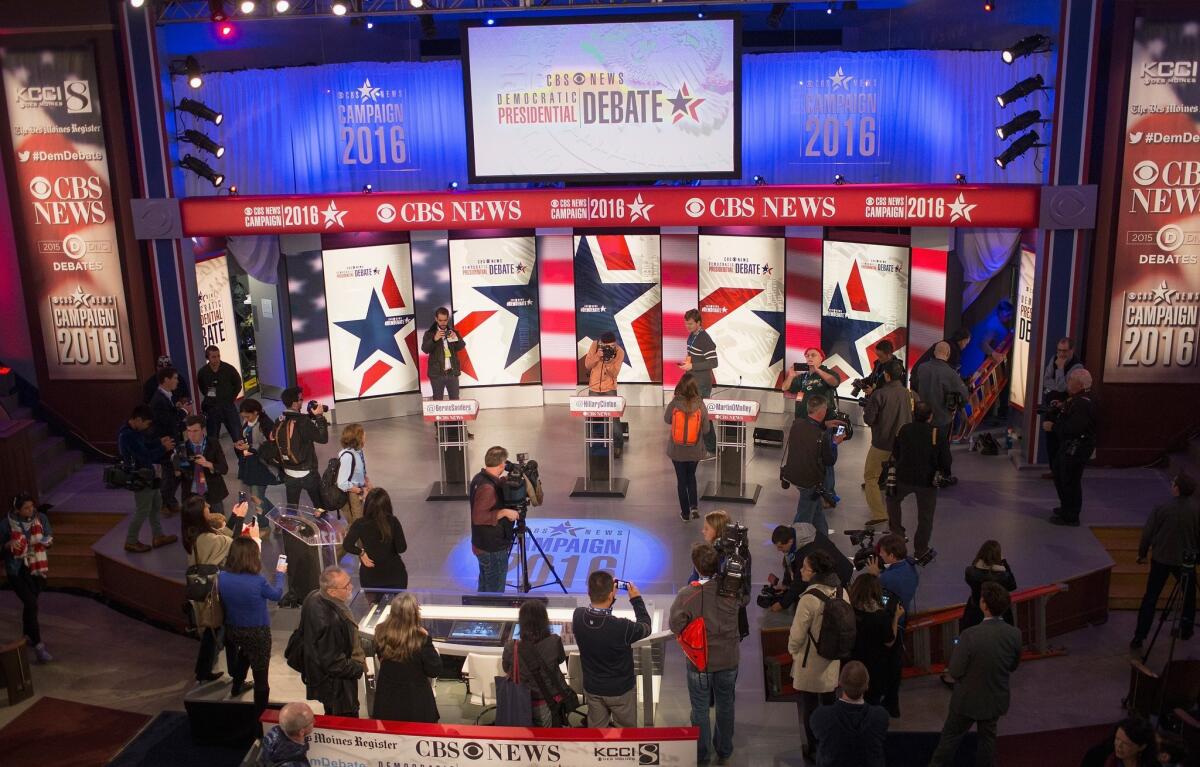
DES MOINES, IA - NOVEMBER 14: Journalists get a look at the stage for tonight’s Democrat debate on the campus of Drake University on November 14, 2015 in Des Moines, Iowa. The debate will be the second for the democratic candidates seeking the nomination for president. (Photo by Scott Olson/Getty Images) ** OUTS - ELSENT, FPG, CM - OUTS * NM, PH, VA if sourced by CT, LA or MoD **
As the Democratic presidential candidates scrambled to prepare for a debate here Saturday that will now focus heavily on the attacks in Paris and the broader issue of national security, the event promises to highlight the clearest contrasts yet among the candidates.
On issues such as economic policy, criminal justice and civil rights, the candidates are not always easily distinguishable. But when it comes to national defense, the front-runner, Hillary Rodham Clinton, stands out as a hawk among Democrats, while Sen. Bernie Sanders, her insurgent rival from Vermont, is a longstanding and staunch opponent of most international intervention.
Leading up to the Paris attacks Friday night, Clinton’s foreign policy record had been a point of vulnerability on the campaign trail. Her rivals have consistently pointed out that she voted in 2003 to authorize military force in Iraq, which Clinton herself said she had come to regret. It’s a point they raised repeatedly in highlighting their concerns with her call recently for a no-fly zone over Syria.
But in the aftermath of the bloodshed in Europe, the former secretary of State will likely argue she is the only candidate on the stage with a viable plan to confront the Islamic State extremists — and with the experience to execute it. Her rivals will highlight the failures of such intervention in the past.
CBS says tonight's Democratic debate will open with a segment on national security
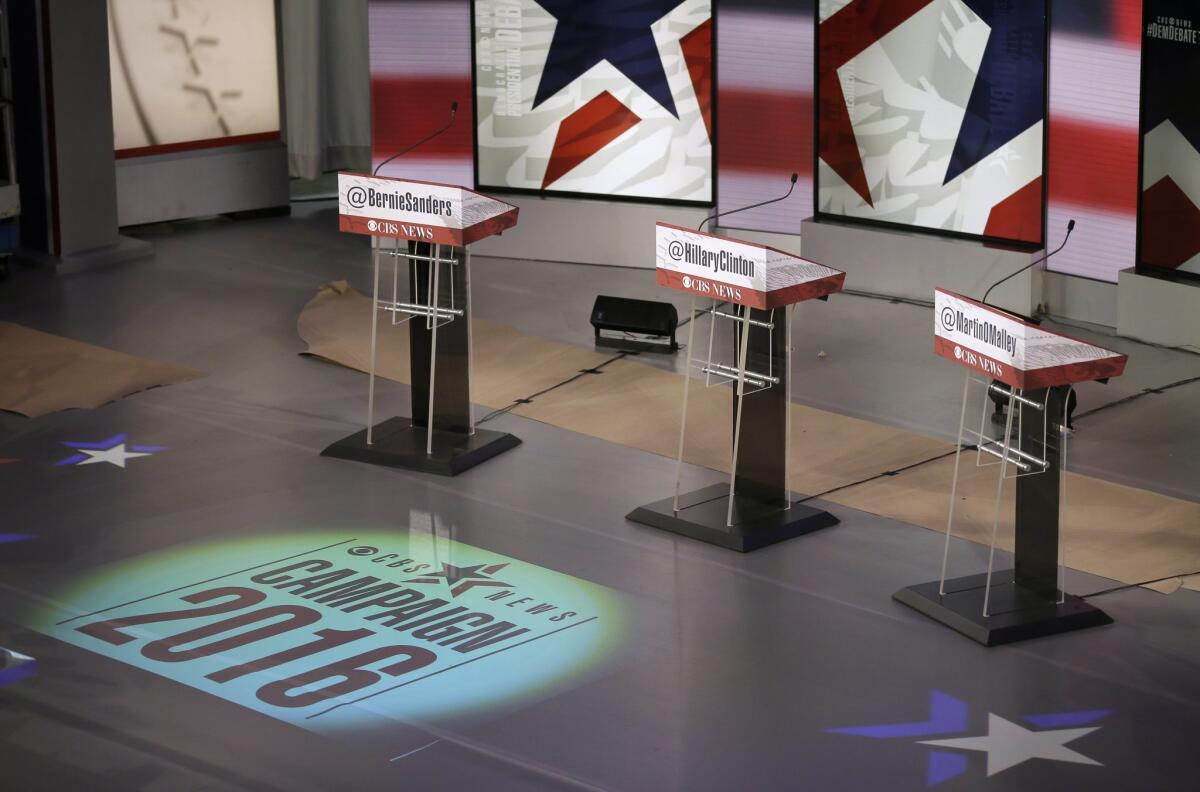
Saturday night’s Democratic presidential debate in Des Moines, Iowa, between Sen. Bernie Sanders (I-Vt.), former Secretary of State Hillary Rodham Clinton and former Maryland Gov. Martin O’Malley will have a greater emphasis on security.
iI the aftermath of the Paris terror attacks, CBS News is changing its game plan for tonight's Democratic presidential debate.
Debate questions prepared earlier this week by CBS News political director John Dickerson and the network's congressional correspondent, Nancy Cordes, were designed to burrow deep into the candidates' views on domestic issues such as the Affordable Care Act and gun legislation. But once the news of the deadly coordinated killing rampage in Paris circulated late Friday afternoon, the moderators and producers started planning a greater emphasis on security in the debate queries.
"This becomes the first segment," said Steve Capus, the executive editor for CBS News who is overseeing the production of the event at Drake University in Des Moines. "You've got to get into how do you handle international terrorism? Do voters believe you are best suited for this? Are voters concerned about how you handle the situation?"
By the numbers
Get the L.A. Times Politics newsletter
Deeply reported insights into legislation, politics and policy from Sacramento, Washington and beyond. In your inbox twice per week.
You may occasionally receive promotional content from the Los Angeles Times.








